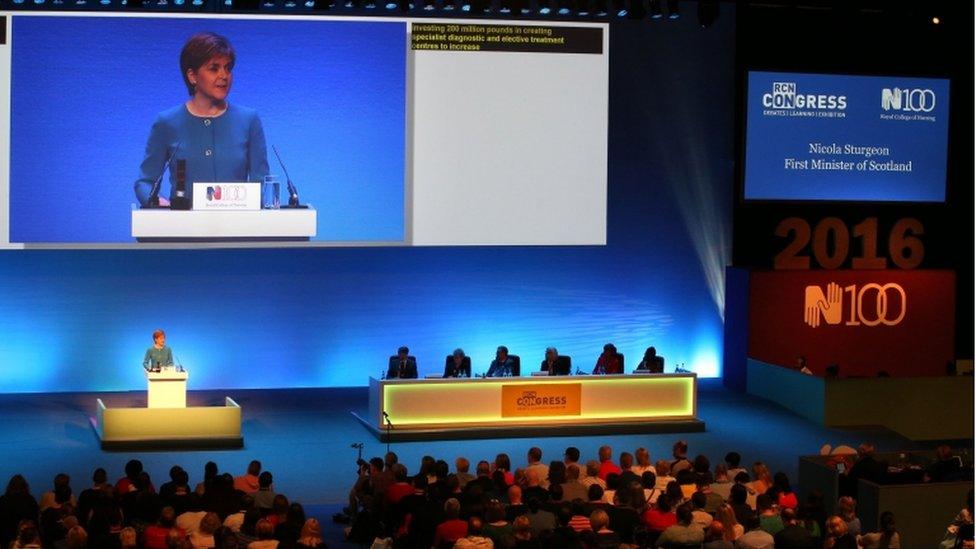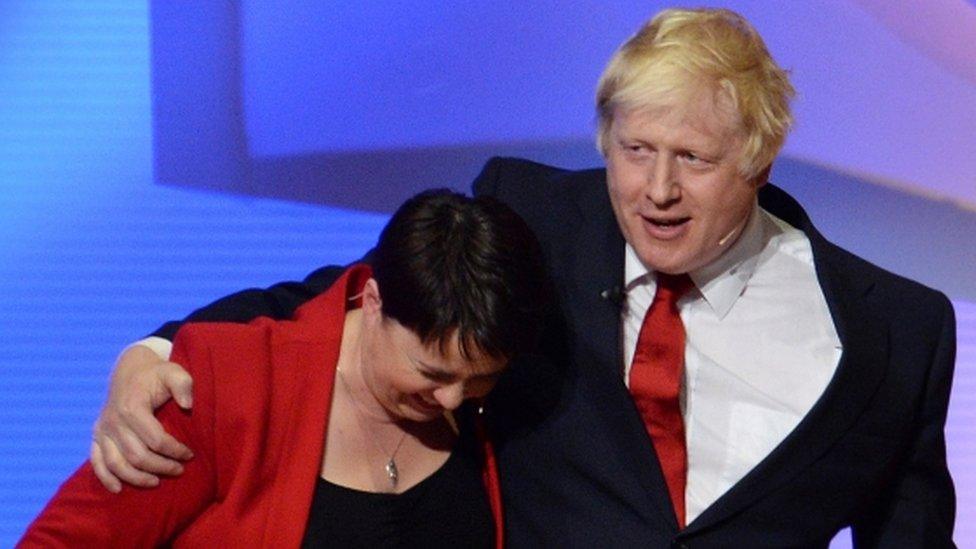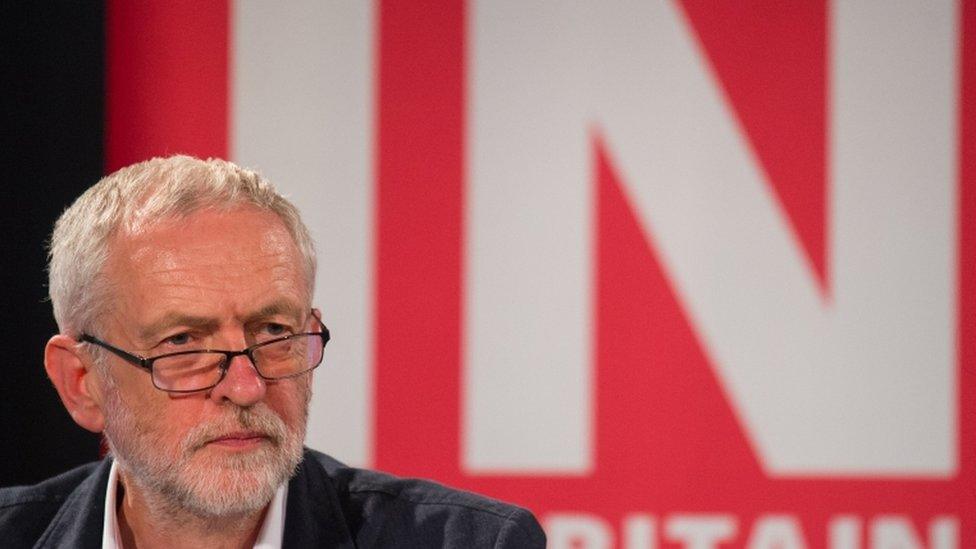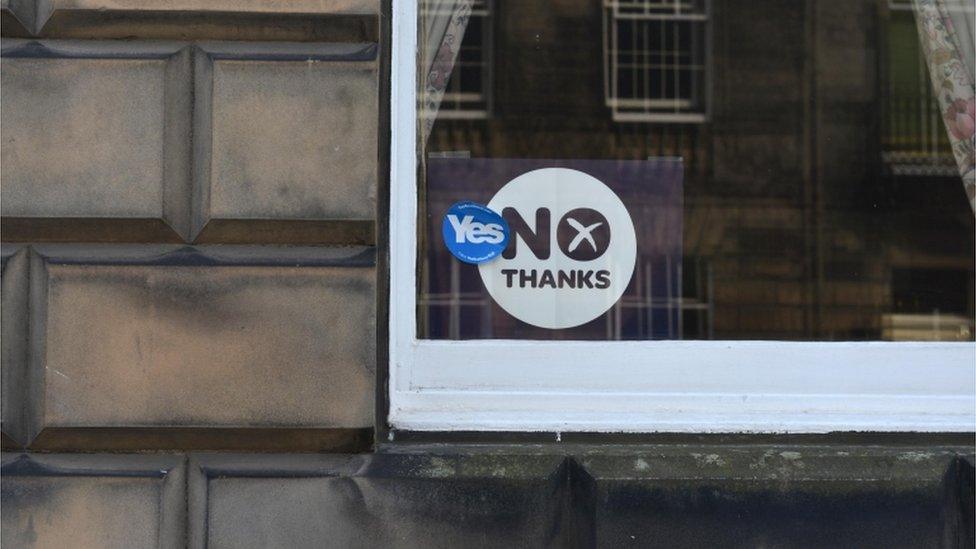EU referendum: Doing what you feel in your heart
- Published

Eleanor Roosevelt was the US first lady during her husband's four terms as US president
In her lifetime, Eleanor Roosevelt prompted a range of responses. As first lady during FDR's four term US Presidency, she brought to the role an influence and status it had never had before and seldom since.
As an aside, her relationship with that other great wartime leader, Winston Churchill, was occasionally cool.
But then Churchill's Epicurean tendencies meant he preferred to conduct business while drinking to the early hours and rising late. The first lady adopted a different approach.
Mostly, though, Eleanor Roosevelt is remembered as a feminist and a powerful advocate of civil rights, notably for African Americans. She carved a global career after her husband's death, working for human rights.
Earlier this week, Nicola Sturgeon quoted Eleanor Roosevelt when facing questions at the Royal College of Nursing Congress in Glasgow.
Ms Sturgeon was asked how she dealt with difficult decisions. Her view, she said, had sharpened somewhat since taking office as first minister.
One presumes she was implying that matters are more challenging still, now that the ultimate toughies, the final verdicts, come her way.

Nicola Sturgeon quoted Eleanor Roosevelt in her speech to the RCN
She told her questioner that she regularly relied upon a comment made by Ms Roosevelt, whom she categorised as a personal hero.
Eleanor Roosevelt had commented: "Do what you feel in your heart to be right. For you'll be criticised anyway."
To be frank, Ms Sturgeon repeated this quote with just a little, tiny touch of ironic asperity. You could just see her thinking: "Eleanor, you should be alive now, in the days of Twitter."
Now, one understands what Ms Sturgeon - and Ms Roosevelt - meant by this comment. They were arguing for a politics of principle. For credo, rather than endless caveat.
Competing pressures
However, sometimes, in politics and life more generally, there will be competing pressures which influence a decision, which drive an outcome.
Sometimes, too, a political leader may have to balance the seemingly "right" decision with the pragmatic, with the tactical move which may have advantageous longer-term consequences.
Such is demonstrably the case with this European Referendum campaign which now enters its final day. There are competing pressures, competing considerations, for political leaders and voters.
Now, to be clear, there are those whose minds are firmly made up. For many, their attitude is entrenched. They are firmly for or staunchly against British membership of the European Union.
But, for others, a range of calculations crowd in upon their thoughts, obliging them to reach a decision in the round.
Ruth Davidson, for example, is generally reckoned to have performed very well in the BBC Great Debate. She was vigorous, inquisitorial and populist in advocating Remain.

Ruth Davidson and Boris Johnson held very different positions on the EU during Wednesday evening's BBC debate
Yet, when this referendum was first called, the Scottish Conservative leader declared her support for the EU "on balance." It was nuanced.
To be absolutely fair, she is decidedly not alone in this regard - although supporters of Leave, seeking to overturn the status quo, tend to project more overt assurance in their utterances.
Even in that camp, however, there may have been competing considerations. Boris Johnson and Michael Gove have been assiduous in pressing for a Leave decision. They have been tenacious and persistent, seldom deflected by rival fire, pursuing arguments founded upon democracy, sovereignty, funding and immigration.
Critic from the Left
But have they entirely excised from their minds the possibility that a Leave vote might also drive David Cameron from Downing Street and so create a valuable vacancy for a young, combative Conservative?
Then consider Labour. Jeremy Corbyn is not, perhaps, an instinctive advocate of the European Union. Left in peace on the backbenches, he might indeed have been a critic from the Left.
But other factors enter the equation. He does not want a reputation for being a supine onlooker in one of the biggest political questions ever to confront these islands.
Further, he accepts the argument advanced by the vast majority of union leaders to the effect that workers' rights are guaranteed by the EU.

Jeremy Corbyn has voiced concerns about the EU in the past
Further, still, there are party calculations. Labour's default standpoint is pro-EU. But party heartlands in the north of England may vote Leave, unless otherwise cajoled.
Labour's worry is that once those heartlands form the habit of voting away from their customary political family, it may extend to other, domestic contests. They might get the taste for it.
More fundamentally, Labour may be shown as out of step with their customary supporters in those areas.
Then there is Scotland. Where tactical voting is ingrained. Where every political calculation is nuanced, infused with the standing constitutional debate.
Independence referendum
How should a Nationalist vote? One, that is, who favours the earliest possible re-run of the independence referendum.
Should they vote Leave in the hope of adding to the prospect of an outcome which destabilises the current UK body politic, driving it from the EU?
Or should they follow Nicola Sturgeon's fervently expressed advice and vote Remain? Her argument being that those who ache for indyref2 need to accumulate a Remain vote north of the Border. Otherwise the ba' is on the slates - and the issue of a different outcome in Scotland simply does not arise.
Then there is the dilemma for Ms Sturgeon herself. I believe that she will move relatively swiftly if Scotland is taken out of the EU against the evident will of her people. I stress, relatively.

Many independence supporters will be pushing for a quick rerun of the indyref if Scotland is forced to leave the EU against its will
I believe she would seek to shore up Scotland's relationship with the EU; such matters as direct access to European institutions.
I believe further she might well seek an early Section 30 order from Westminster in order to pave the way for a possible referendum. I stress, possible. Indyref2 would not be seen as automatic or guaranteed. But perhaps the mood in Team Sturgeon is moving towards probable, in the circumstances outlined above.
Does Nicola Sturgeon want that to happen? That would be a No. Firstly, she genuinely supports EU membership, for the existing UK and a projected future independent Scotland.
Secondly, I reckon she is concerned that a further indy plebiscite - to be held, potentially, within the two year period of negotiations for Brexit - might simply be too abrupt for the Scottish people.
Constitutional crisis
How about her rivals over the independence issue? Say you are a Scottish Tory. Say you are sceptical about EU membership but you are ready, just, perhaps, to give it your backing. On balance.
Do you vote Remain in Scotland, aware that this might, perhaps, bring about the constitutional disjuncture that could prompt indyref2, if your counterparts in England vote Leave?
Or do you vote Leave, aware that you might be out-voted in Scotland - but might then add to that pile of UK votes for departure, thus perhaps creating a constitutional crisis by another avenue?
Not easy, all round. Too many calculations. Too many factors.
Perhaps Eleanor Roosevelt was right after all. Do what you feel in your heart to be right. For you'll be criticised anyway.